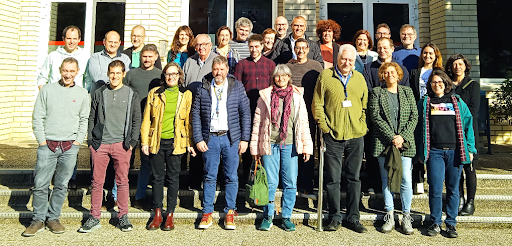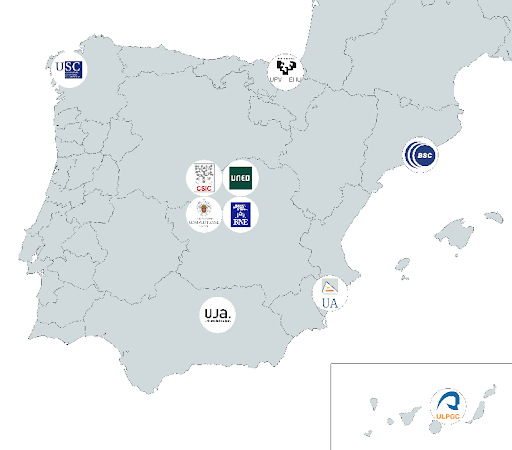The HiTZ Centre at the University of the Basque Country (UPV/EHU) will lead the integration of CLARIAH-ES into the European distributed research infrastructures CLARIN and DARIAH.
The HiTZ Center at the UPV/EHU organised the first meeting of the distributed research infrastructure CLARIAH-ES in Donostia on January 25 and 26. This infrastructure will coordinate Spain’s participation in CLARIN and DARIAH, two of Europe’s largest scientific infrastructures in the humanities and social sciences.

Both infrastructures are part of the European Strategic Forum for Research Infrastructures (ESFRI), constituted by EU Member States and the European Commission. was established in 2002 to coordinate a common strategy for pan-European scientific facilities and research infrastructures.
CLARIN is composed of centres from 24 countries that support the exchange, use, and maintenance of linguistic data and tools for research in the social sciences and humanities. One of CLARIN's main objectives is to ensure that all linguistic resources and tools included in the infrastructure are accessible through a common portal to all researchers.
DARIAH seeks to enhance research and teaching in the arts and humanities with digital technology. Its efforts focus on driving the production, preservation, and exchange of multimodal data, services, and AI tools, ensuring their long-term accessibility and dissemination. DARIAH also offers didactic material and training opportunities to facilitate the development of digital research skills, as well as the adoption of best practices at a transnational and transdisciplinary level.
Dr. German Rigau, deputy director of HiTZ and national coordinator for both infrastructures, said: 'Our participation in CLARIN and DARIAH will be valuable for multiple reasons. On the one hand, CLARIAH-ES will strengthen these European infrastructures through our data repositories, computing facilities, and knowledge of our official languages (Spanish, Basque, Galician, and Catalan) and cultural heritage in the European and global contexts. On the other hand, CLARIAH-ES will enable our researchers to access multimodal technologies and computational resources that are grounded in the most advanced artificial intelligence. The ambitious goals of CLARIAH-ES can only be achieved by gathering together the necessary resources in terms of data, computing facilities, and expert knowledge that are not present in any single research centre in Spain. Each research centre in CLARIAH-ES provides capabilities, methodological expertise, and key pieces of technology, knowledge, and resources that together create the necessary distributed research laboratory to successfully address the challenges of this initiative.'
The CLARIAH-ES consortium currently brings together a multidisciplinary group of experts from 10 leading research institutions in social sciences, arts, and humanities, library science, linguistics, artificial intelligence, language technologies, computer science, and high-performance computing: the Basque Center for Language Technology (HiTZ) at the University of the Basque Country (UPV/EHU); the Centre for Human and Social Sciences (CCHS) at the Spanish National Research Council (CSIC); the Galician Language Institute ((ILG) and the Singular Center for Research in Intelligent Technologies (CiTIUS), both at the University of Santiago de Compostela (USC); the Miguel de Cervantes Virtual Library (BVMC) at the University of Alicante (UA); the Laboratory of Innovation in Digital Humanities (LINDH) at the National University of Distance Education (UNED); the Barcelona Supercomputing Center – National Center of Supercomputing (BSC-CNS); the Complutense Laboratory of Digital Humanities (UCMLabHD) at the Complutense University of Madrid (UCM); the Center for Advanced Studies in Information and Communication Technologies (CEATIC) at the University of Jaén (UJA); the Research Institute for Textual Analysis and Applications (IATEXT) at the University of Las Palmas de Gran Canaria (ULPGC); and the National Library of Spain (BNE).

In addition to researchers from the 10 centres that currently make up the CLARIAH-ES infrastructure, the meeting also included representatives from Scayle and Dialnet.
The HiTZ Center will manage the administrative office and the new infrastructure CLARIAH-ES. As Dr. Rigau explains: 'In the current context of digital transformation, study, research and development in humanities, arts and social sciences require scientific and technological infrastructures that allow for the computational treatment of textual, visual, and/or sound data. CLARIN and DARIAH promote multilingualism, interoperability, maintenance and reuse of resources, open science, visibility and scientific cooperation in Europe. Thanks to our participation in both infrastructures, researchers will have access from their computers to all the data, technology, infrastructure and resources needed to research the cloud with the most advanced digital and artificial intelligence tools. In this manner, the CLARIAH-ES infrastructure will allow effective progress in the digital transformation of research in the humanities and social sciences within the context of the European Research Area.'